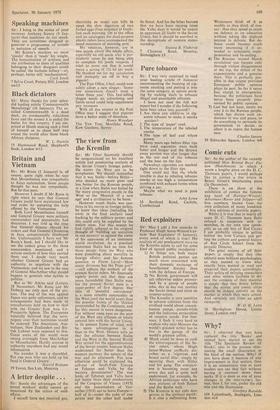Britain and Vietnam
Sir: Mr Rosie (2 January) is, of course, quite right when he says that Mountbatten was sympathetic to Asian nationalism. Some people thought he was too sympathetic. But let that pass.
However I doubt if Mr Rosie is right when he says that General Gracey could have maintained law and order by accepting the help offered by the Vietnamese.
Both Lord Mountbatten himself and General Gracey were military commanders and presumably had directives. I was told at the time that General Gracey obeyed his orders and that General Christiron in Java conspicuously disobeyed his. Unfortunately I have not Mr Rosie's book, but I should like to see the orders given to the three commanders mentioned, and a serious analysis of how they carried them out. I doubt very much whether General Gracey had an authority to negotiate with the Vietnamese, and we saw in the case of General MacArthur what should happen to generals who dabble in politics.
But as Mr Atkins said (Letters, 28 November), Mr Rosie and Mr Driberg see only part of the pic- ture. The end of the war against Japan was quite unforeseen, and no arrangements had been made or consultations held on how to deal With the Greater East Asia Co- Prosperity Sphere. The Europeans naturally believed that the sove- reignty over their territories would be restored. The Americans, Aus- tralians, New Zealanders and Bri- tish Labour were opposed to this. Great areas of the world were swung overnight from MacArthur to Mountbatten. Hardly anyone in authority anywhere had any sound information.
No wonder it was a shamble. But one man who can hold up his head is General Gracey.

































 Previous page
Previous page